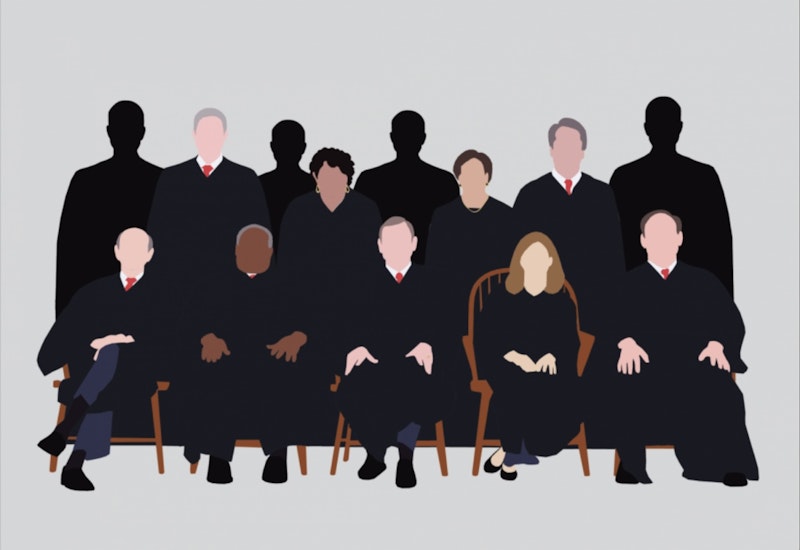In 2016, Republicans crossed the line by nominating the unqualified (for any office), unprincipled Donald Trump for the presidency. Today, a growing number of Democrats are crossing that same line—by demanding an immediate (that is, pre-2024) increase in the number of Supreme Court justices.
Democrats no longer have a court majority that rubber-stamped “constitutional” or “unconstitutional” based on what their party preferred, not on what the Constitution states. We’re told that the 2022 overturning of Roe v. Wade violated a “fundamental right”—a designation that Democrats never extend to the “right of the people to keep and bear Arms,” which (however we interpret it, and unlike the right of only the abortion industry to unregulated capitalism) is at least there for all to read. Furthermore, civil libertarians (including former ACLU president Ira Glasser) have warned about the surging animosity of today’s academic left (i.e., tomorrow’s Democratic lawmakers) towards the First Amendment’s “freedom of speech” protection. We might eventually have a Democratic Party that defines “constitutional rights” in opposition to the Constitution.
Evidently in the belief that their policy ends justify any means, many party “progressives” are calling upon President Joe Biden to name, without any high court vacancies, several new justices who will rule that they see the Emperor’s new “fundamental rights”—a restoration of that Democratic-appointee majority, which these activists regard as their “fundamental right” (and often refer to as “balance”). Despite his many immoral, possibly criminal actions, President Trump (with a Republican Senate at the ready) never nominated a 10th justice. Do these Democrats intend to out-Herod Herod?
Sen. Elizabeth Warren of Massachusetts, one of the most prominent proponents, offers as reassurance the observation that the court’s number has changed before. True, before 1869—not since. We also had slavery and secession movements (culminating in the Civil War) before then. I’d like to believe that the 1860s settled a few issues for good. Surely “progressives” can appreciate that.
Many such proponents think they’re scoring a gotcha when (“with a seeming air of triumph,” to quote Hamilton) they retort: “Exactly where in the Constitution does it say that the Supreme Court must have nine members?” One imagines that the snotty answer is: right next to where it guarantees a Democratic-appointee majority, abortion laissez faire, and all those other “fundamental rights.” But nobody denies that the Constitution doesn’t specify a number, the implication being that it’s up to us to set one. What’s not implied, however, is that that number is endlessly re-settable.
Imagine an early town charter that declares there shall be “signals to direct traffic”—but doesn’t indicate what a traffic signal looks like. So, we invent one: vertical lights of red (stop), yellow (slow), and green (go). And that’s a traffic signal. We don’t get up one day and reverse the placement of red and green in order to confound the colorblind. We don’t one day make the lights horizontal. A few years in, the police don’t decide that now red is slow, yellow is go, and green is stop—but tell no one. Nobody suggests that we substitute the new colors of purple, orange, and blue—and let drivers decide for themselves what they mean. Time has defined a Supreme Court “majority,” and we have no more business redefining it than we do “war,” “slavery,” and “ignorance.”
Some champion court expansion as retribution for then-Senate Majority Leader Mitch McConnell’s refusal to grant a hearing to President Barack Obama nominee Merrick Garland in 2016. But that contraction of the court was (rightly) condemned as an abomination; when did it become a precedent? And there’s no guarantee that America won’t emerge from the 2024 (or any) election with a Republican White House—and a Republican Senate. If that GOP starts talking expansion, will the Elizabeth Warrens be able to say anything other than right-for-me-but-wrong-for-thee (“false equivalence”)?
But if those who don’t find anything particularly sacred about the nine-member court do get their way, there’s something they’ll have to contend with: the mass civil disobedience of those who won’t find anything particularly sacred about this expanded court.
MSNBC has become a repository of the worst aspects of this project. Frequent guest Elie Mystal has proposed a 28-member court, an absurdity obvious to everyone but himself. Host Mehdi Hasan, listing the expansion-justifying sins of the current court, included: “stripp[ing] the states’ ability to determine their own gun control policies.” That’s precisely what Roe did regarding abortion—again, obvious to everyone but himself. President Franklin Roosevelt, host Chris Hayes informs us, “violated a ton of norms but strengthened American democracy.” As an alleged example, he mentions FDR’s “threatening to do things like pack the court.” The making of threats is what a thug does to his victims, not how the executive branch of our republic acts towards the judicial. Is that how progressives regard an independent judiciary? Would any progressive suggest that President Trump had “strengthened American democracy” when he “violated a ton of norms”? At the risk of making the too-fine point: This is a level of corruption that out-Trumps Trump.
Progressives have been obsessed with the “Gilead” of Margaret Atwood’s The Handmaid’s Tale since its publication in 1985. But reality confronts us with its own dystopias. In Things Are Never So Bad That They Can’t Get Worse, journalist William Neuman’s account of Venezuela’s 21st-century descent into totalitarian socialism, he asks economist Ruth de Krivoy, former president of its Central Bank, how the national collapse happened. Among the factors she cites: “[President Hugo] Chàvez increased the number of judges in order to control the Supreme Court, and the rule of law disappeared.” In Israel, Prime Minister Benjamin Netanyahu’s “judicial reform” to limit what he sees as undue Supreme Court control over public policy has been condemned by the American left in the strongest of terms, with the straightest of faces. And here at home, we already have an example of what happens to a political party that is unable (or unwilling) to fend off extremist elements.

